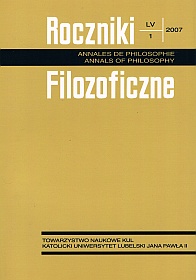Axiomatic Approach to the Problem of Theodicy
Abstract
The problem of justification of the almighty and perfect Creator in the face of the fact that there is evil in the world was posed as early as the 3rd century BC by Epicureans and Stoics. The author of the article uses St. Thomas Aquinas’ and G.W. Leibniz’s philosophical inspirations to demonstrate by means of formal-logical means that inferring non-existence of evil from existence of God, as well as non-existence of God from existence of evil is a logical error. The analysis begins with the theory of an omniscient, infallible and omnipotent being, identified with God. “Will”, “allowance” and “objection” with respect to facts are differentiated and the law of logical squares with respect to acts of will and the iteration of states of God’s will are presented. A theistic axiology is suggested, religious fatalism and the superstition of predestination are refuted. The whole of the axiomatic calculus tends to the conclusion that evil in the world of the omnipotent Creator results from the purposefully established fortuitousness within the laws of nature, in the name of man’s freedom of choice and possibilities of development.
References
Christian C.: Eine Note zum Gottesbegriff, „Religion-Wissenschaft-Kultur” 8 (1957), s. 227-228.
Kołakowski L.: Jeśli Boga nie ma. O Bogu, diable, grzechu i innych zmartwieniach tak zwanej filozofii religii, Kraków: Znak 1988.
Kushner H. S.: When Bad Things Happen to Good People, New York: Avon Books 1983; pol: Kiedy złe rzeczy zdarzają się dobrym ludziom, tł. M. Koraszewska, Warszawa: Verbinum 1993.
Nieznański E.: Logika przedmiotów, „Studia Filozoficzne” 6-7 (1988), s. 101-115.
Nieznański E.: The Logic of Objects, [w:] Philosophical Logic in Poland, ed. J. Woleński, Dordrecht: Kluwer Academic Publishers 1994, s. 129-152.
Nieznański E.: O zawieraniu się pojęć i o stosunku „jest”, [w:] Co daje współczesnemu człowiekowi studium filozofii klasycznej, red. P. Mazanka, M. Mylik, Warszawa: Wyd. ATK 1997, s. 113-125.
Nieznański E.: Ontologiczne podstawy logiki Arystotelesa, „Przegląd Filozoficzny”. Nowa Seria 11 (2002) nr 1, s. 35-43.
Nieznański E.: Logiczne systemy przedmiotów i pojęć, „Zeszyty Naukowe WSHiP”. Seria Prawo, z. 9, 2004, s. 126-153.
Stockhausen A. von: Der Geist im Widerspruch. Von Luther zu Hegel, 2. Aufl., Weilheim–Bierbronnen: Gustav-Siewerth-Akademie 1990, s. 11.
Swinburne R.: Existence of God, Oxford: Oxford University Press 1979.
Weingartner P.: Religiöser Fatalismus und das Problem des Übels [w:] Der Modernismus. Beiträge zu seiner Erforschung. Festschrift für Th. Michels, hrsg. von E. Weinzierl, Graz: Styria 1974, s. 369-409.
Copyright (c) 2007 Roczniki Filozoficzne

This work is licensed under a Creative Commons Attribution-NonCommercial-NoDerivatives 4.0 International License.





